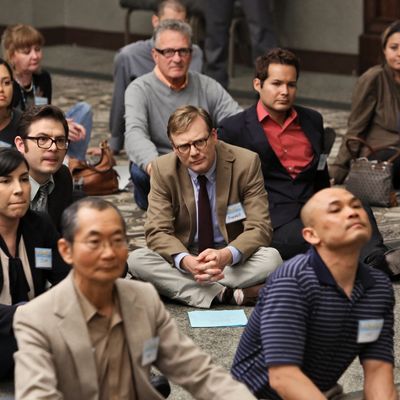
It’s hard to know quite what to make of Review, and that’s part of its fascination. Adapted by Eastbound & Down’s Andy Daly from the similarly slippery Australian series Review with Myles Barlow, it’s one of those shows you have to take figuratively, not literally. Its hero is a critic named Forrest MacNeil (Daly), who reviews experiences and sensations rather than books, films, music, and the like. Viewers of Forrest’s TV show write in to suggest new subjects, and he promptly leaves the soundstage and embarks upon a mission to learn what it feels like to be a racist or an armed robber, or to make a sex tape, or to sleep with a celebrity.
That might sound like the description of a series that’s willing to do anything for a laugh, and Review does hover on the edge of shamelessness at all times, as if creating a more buttoned-down, scripted equivalent of a humiliation-based reality series: Think Jackass in pleats.
But there’s more going on here than kamikaze foolishness. There’s often gentle social satire folded into the goofiness, as in the racism segment from the pilot episode, wherein Forrest decides to gather raw data on African-Americans so that he can convincingly hate them. He gathers all of his factoids at a family reunion in a park where the fellow manning a grill won’t shut up about the catering business he wants to start; driving away, he spots a random group of black folks on a sidewalk and yells, “Hey, shut up about your catering business!” That’s a sharp comment on how bigots extrapolate one or two isolated experiences into grand summations of whole groups. Sharper still is the moment when Forrest bursts into a gathering of neighborhood friends that includes a black couple, spewing racist hogwash. At first, the room greets his yammerings as an absurdist joke, since everyone knows that Forrest isn’t racist; but once Forrest confesses that it’s another performance art piece for his TV show, one of his African-American neighbors tells him that even though he’s not an overt racist, he’s been exhibiting signs of passive racism for years, then makes a list for Forrest. It’s not short.
Once the initial tittery shock of each new mission wears off, and Forrest wriggles into whatever character or situation he’s been assigned, the segment always focuses on Forrest’s peculiar yet always mysterious psychology, which is shaped by the entertainment industry that shaped him. There’s a eerie blankness to the man, a question mark in his smile. He’s not a total sociopath like Steve Coogan’s Alan Partridge — who once killed a man on live TV, and who seems a clear inspiration both on this series and the Australian version — but he’s in the ballpark. Otherwise, why would he do the things he does? And the audience must be missing some crucial moral gear as well, otherwise why would it (or more accurately, we) watch?
Tonight’s episode, the third to air, is a good one for newbies, because it gives a sense of how agreeably odd this series is, as well as how elastic its comic tone can be. Titled “Pancakes, Divorce, Pancakes,” it begins with Forrest embarking on a mission to eat fifteen pancakes in one sitting at a diner (in response to a viewer’s question about a seemingly oversized standard recipe on a box of pancake mix). Sandwiched in the middle is Forrest asking his wife, Suzanne (Jessica St. Clair), for a divorce after many years of seemingly contented marriage. I won’t describe exactly how this story resolves except to say that it’s more painful than you might imagine, at times verging on early Albert Brooks–style cringe comedy. In its modest way, Review prods us to think about the instability of seemingly stable relationships, and the possibility that only one party might be satisfied in a relationship that the rest of the world thinks is peachy. The show ends, as the title suggests, with a return to the diner, and a rematch with that pile of pancakes, with Forrest in a different headspace. The results are mortifying.
As in the Australian version, Forrest’s narration of his own adventures is a study in milquetoast pomposity, fusing mixed metaphor-laden accounts of his bravery and some moments of drollery that James Thurber might have written if he’d been wiling to work blue. (In the sex tape segment, Forrest failed to convince Suzanne to participate in the experiment, then bought a $4,000 state-of-the-art sex doll named Katrina. Huffing and puffing his way up the stairs with the doll under one arm, Forrest narrates, “Katrina’s alluring titanium infrastructure gave her a weight of over hundred pounds — an obvious design flaw given that it’s impossible I’m the most out of shape person who owns one of these.”)
I should stress again here that Review is more of an experience than a statement; if you ask yourself, “What’s the point?” you’ll probably never get an answer, and you’ll miss out on the agonizing pleasure of this most unusual series, which imports a style of TV comedy that was perfected in the United Kingdom and its far-flung colonies, and somehow Americanizes it without snuffing its daft spark.





